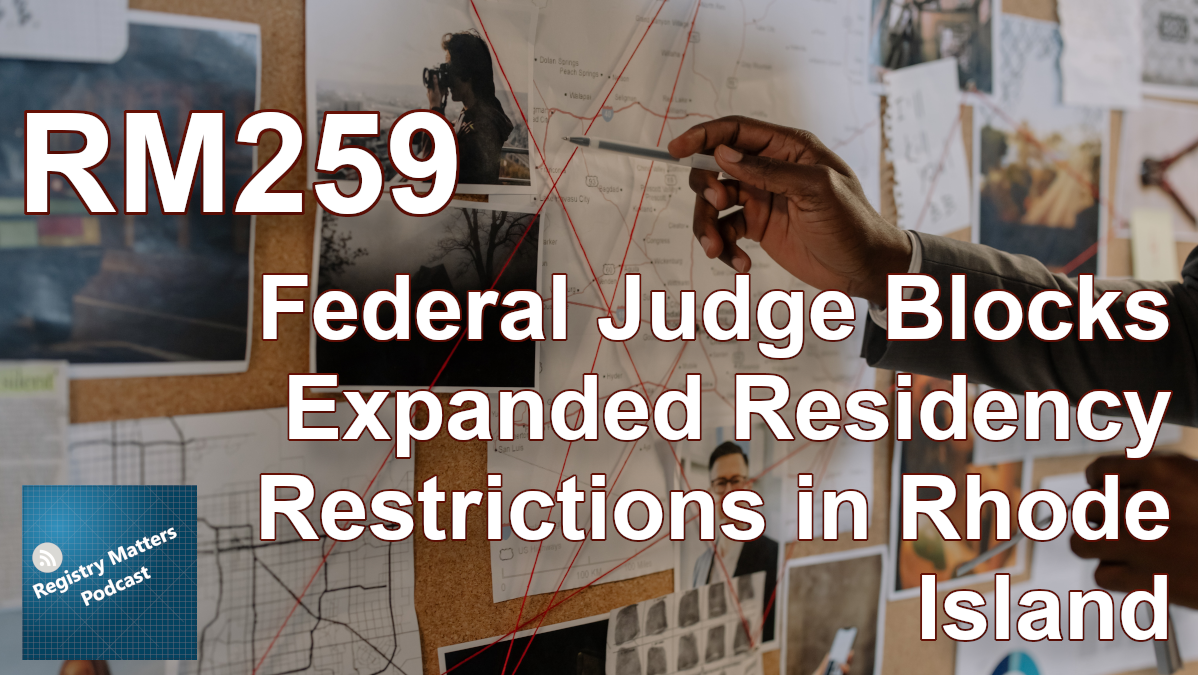We devote much of the show to good news out of Rhode Island, where a federal judge ruled that residency restrictions that were applied retroactively are unconstitutional. The Rhode Island law would have required tier-three PFRs to move out of the expanded residency zone, even if they owned a home within it.
The judge saw many problems with the law, including that the law was vague, and that the state hadn’t even clearly defined what was meant by a school. Since the law created confusion about what is meant by a school and its property, an ordinary citizen would not know whether they were breaking the law.
Although there is a likelihood the state’s attorney will appeal the motion, it is an important decision, not just for Rhode Island residents. A negative ruling would have the potential to spread to other states.
A listener’s question about GPS monitoring led to a discussion about the expenses that PFRs are burdened with. The listener has spent nearly 13,000 dollars on monitoring and wanted to know if any of that money would be refunded if the law were found unconstitututional. The answer is most likely no.
We also discussed recent wins in New Mexico and the legislative process and what does and does not work when trying to persuade lawmakers and touched on the death of a PFR that happened recently in Michigan.
Highlights
[03:15] Listener question about GPS monitoring in Wisconsin. [15:52] Why data doesn’t always get you what you want. [22:00] Legislative victories in New Mexico. [32:04] Rhode Island Judicial Decision. [1:01:33] Discussion of a story out of Michigan in which a PFR was killed with a moose antler.How to Contact and Listen to Registry Matters
- https://www.registrymatters.co/podcast/rm241-alabama-rules-pfr-restrictions-just-a-civil-regulatory-scheme
- Leave voicemail: 747-227-4477
- Email us: registrymatterscast@gmail.com
- Support us on Patreon: https://www.patreon.com/registrymatters
- Follow us on Twitter: https://twitter.com/RegistryMatters
- Join the Discord server: https://discord.gg/6FnxwAQm57
- Want to support Registry Matters with some swag: https://shop.spreadshirt.com/registry-matters
- Apple Podcasts: https://itunes.apple.com/us/podcast/registry-matters/id1305039280
- Google Play Music: https://play.google.com/music/listen?u=0#/ps/Icuxbpzvyti7wtoredipbtiojqy
- RSS: https://www.registrymatters.co/feed/podcast/
- Spotify: https://open.spotify.com/show/3d75P7Kc37n2l79m89F9KI
- YouTube: https://www.youtube.com/registrymatters
The Registry Matters Podcast’s mission is to cover issues surrounding the Registry. We cover cases that will peel back the veneer of what we need to do to change our lives for the better. We cover news articles that spark conversations about the total insanity of this modern day witch hunt. This podcast will call out bad policy and call out those that are making bad policy.
To change things for the positive, we need to act. We are 6-7-8-900k strong. With that many people, plus their friends and family, over a million people are affected by the registry. We should be able to secure donations to hire lawyers and lobbyists to move the agenda in our favor. We need our people to be represented.


Leave a Comment